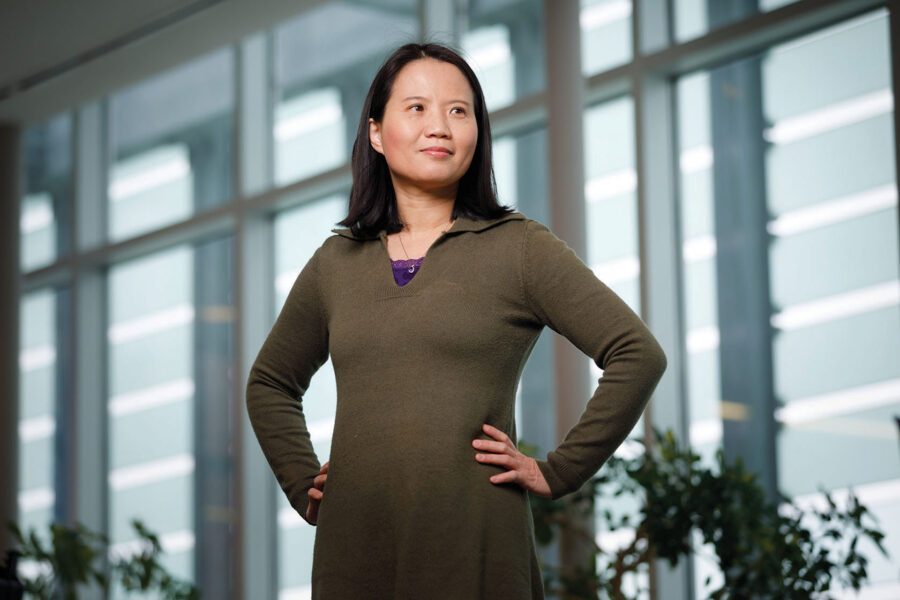The University of Nebraska Medical Center boasts a formidable cohort of women who drive scientific exploration and advance modern medicine in Nebraska and beyond. These visionary researchers and innovators are propelled by grit, resilience and personal resolve to “find a better way.” Among them: Beth Beam, PhD; Rebekah Gundry, PhD; Breanna Hetland, PhD; and Hongying “Daisy” Dai, PhD.
Big Data, Artificial Intelligence & Public Health Advocacy
For two decades, Hongying “Daisy” Dai’s STEM research has been fueled by a passion for collecting big data and translating it into tangible benefits for society.
Armed with a bachelor’s degree in economics, master’s degrees in mathematics and statistics and a PhD in statistics, Dr. Dai spent the first 10 years of her career in Kansas City, teaching biostatistics and crunching numbers for pediatricians and cancer specialists in labs at the University of Missouri and Children’s Mercy Hospital.
As a research assistant, “I realized the limitations of waiting for data to be handed to me,” she said, adding: “I wanted to break the mold” as a lead investigator in population health – an emerging field combining STEM, public health and medicine.
“When there’s a knowledge gap or an emerging health concern, I step up” with a hypothesis and a research model.
“The world is changing fast. … The sky is the limit for the impact we can make.”
Hongying “Daisy” Dai, PhD
Social media and generative AI are crucial tools in Dr. Dai’s own research into substance use, particularly among adolescents and racial minorities.
Currently, she is examining transition patterns of adolescents who experiment with substances once or twice for the allure and later progress to addictive and hazardous substances. “When kids start to use these substances, it’s very hard for them to break free.”
Her study findings have spurred proactive efforts, including a free substance training program in Omaha-area schools focusing on e-cigarettes, an emerging concern in youth health.
“I like to catch new things from various sources,” Dr. Dai said of her ongoing monitoring of online attitudes toward public policies, maternal health, chronic diseases and much more. She also monitors health-related misinformation on platforms like X and TikTok.
For each study, she noted, “we analyze millions of tweets and posts,” leveraging AI technology to gain deeper insights into patterns and risks. “Sometimes the big data is so broad and new, it gets national media attention,” Dr. Dai said. “By disseminating our findings widely, we amplify our impact and catalyze meaningful change in public health policy and practice.”
•••
In 2001, Dr. Dai left China and arrived in the United States as a graduate student at the University of Kentucky in Lexington. There, she was a research assistant to Henrietta Bada-Ellzey, MD, a neonatologist and dedicated researcher in children’s health. Under her mentorship, Dr. Dai’s passion and perseverance as a researcher flourished.
Dr. Dai joined the UNMC College of Public Health in 2018 as an associate professor of biostatistics and has since been promoted to professor and associate dean of research. She received UNMC’s New Investigator Award in 2019, in part, for her research on e-cigarette use and prevention among U.S. teens. In 2023, she was named a UNMC Distinguished Scientist for her work in statistical epidemiology, health disparities and substance use and prevention.
To date, Dr. Dai has participated in studies supported by more than $60 million in research funding.
Beyond research, Dr. Dai is “deeply committed” to mentoring the next generation of medical and public health professionals. UNMC’s Medical Doctorate/Master of Public Health dual degree program is the catalyst. Dr. Dai coordinates the research component.
“Medical students have a passion for society and are interested in having a better understanding of their patients,” she said. “This is an emerging trend I didn’t see five years ago.”
It’s important, she said, because in translational medicine, the more a care team understands the root causes of diseases and behaviors, the more they can impact a patient’s wellness through holistic approaches.
Dr. Dai also is invested in community outreach and education to empower individuals with knowledge and resources to make informed health decisions, and to raise awareness of emerging health threats and preventive measures.
“The world is changing fast. … The sky is the limit for the impact we can make.”
